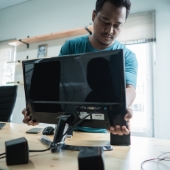 Most tech experts will tell you that a PC should last for 3–5 years before it needs to be replaced. Of course, with the right amount of care and maintenance, you may be able to get a bit more use out of your machine. Here are some ways you can make your computer last longer.
Most tech experts will tell you that a PC should last for 3–5 years before it needs to be replaced. Of course, with the right amount of care and maintenance, you may be able to get a bit more use out of your machine. Here are some ways you can make your computer last longer.
Clean and cover your computer
Dust and dirt are your computer’s number one enemy. They can get caught between the keys and other moving parts, which will then cause problems with how the computer operates. To avoid any performance issues or long-term damage, it is best to clean your computer regularly and be sure to cover it when not in use to prevent dust and dirt from building up.
Use canned air to clear out any dirt, especially from fans. If these get blocked with too much debris, the fan’s ability to cool down the computer decreases, which then raises the risk of overheating.
When cleaning computer screens, only use the appropriate screen cleaners. Never use window cleaners because they contain ammonia, which can dull and damage the screen.
Avoid eating food or placing drinks next to your computer. Food particles can get stuck between the keys on your keyboard, making it difficult to type, and spilling drinks on your computer can cause it to short circuit.
Keep your computer cool
When a computer is switched on, it produces heat. If the temperature is not regulated properly, a computer can overheat, damaging its processor, graphics card, and other internal components. This can cause your computer to malfunction and eventually break down.
To prevent this, place your computer in a well-ventilated room and away from direct sunlight. Make sure the cooling fans and heat sink are working properly. If you’re living in a hot climate, you may need to purchase additional cooling fans or use your computer in an air-conditioned room.
Update your computer’s operating system and programs
Updating your operating system is essential to maintaining optimum system efficiency. Updates include patches, security fixes, and software/driver updates that make your computer compatible with the latest web applications and software.
It’s essential to update your antivirus software as well. Antivirus updates contain new malware/virus definitions that will help you identify and stop new online threats.
Perform disk maintenance regularly
Traditional hard drives can crash from file system errors, bad sectors, improper shutdowns, and other issues. If the corruption is severe enough, it could damage files beyond repair and prevent your computer from starting. Performing regular error checks will help you spot potential hard drive issues before they blow out of proportion.
You should also run Disk Cleanup and Disk Defragmenter at least once a month. Disk Cleanup will remove unnecessary files that take up hard disk space, while Disk Defragmenter consolidates fragmented files into one space to help increase computer performance.
Invest in surge protectors
Power surges, regardless of magnitude, can damage or completely destroy your computer’s components. Using a surge protector is a good way of protecting your computer against sudden power surges.
When shopping for a surge protector, check the joule rating. It indicates how much energy the surge protector can handle before it needs to be replaced. The higher the number, the better.
You should also look for a surge protector with an auto-shutoff feature. In the event of a power surge or other electrical problem, the surge protector will automatically shut down to protect the devices connected to it.
Switch to solid-state drives (SSDs)
Unlike hard drives, solid-state drives have no moving parts, making them more resistant to wear and tear and accidental drops. The absence of moving parts also means SSDs require less power to operate compared to hard drives.
SSDs are also 100 times faster than traditional hard drives. This results in faster boot and application loading times and improved system responsiveness.
Following these tips will help extend the life of your computer. If you want to learn more, give our specialists a call today.